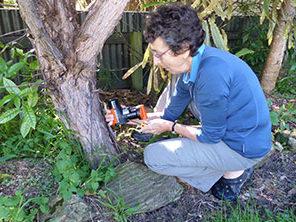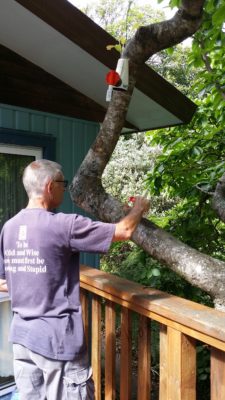When Picton organisers heard they’d won a competition to become a Kiwibank Predator Free Community earlier this year, they called a public meeting – and a hundred people turned up!
“It was a very good turnout,” says co-ordinator Siobain Browning. “The Kiwibank funding gave us the opportunity to organise a big event and talk to people about subsidised traps. We want to increase the traps in people’s backyards. We’re aiming for 1 in 4 Picton households. So far there are around 240 traps in gardens and we’re aiming for 600.”

The Picton community has had a bit of a head-start on other Kiwibank Predator Free Community winners in that the core group of organisers had already formed Picton Dawn Chorus and begun trapping in public reserve areas and some urban areas before submitting the Kiwibank video entry.
“We already had a group of people who knew about predator free,” says Siobain. “The Kiwibank funding meant we could start the next push – reaching out to those who didn’t already know. And now we’ve got a flier ready and we’re about to go to the next level again!”
Kiwibank Predator Free Communities asked groups to make a video about who they were and what they wanted to achieve with funding from Kiwibank. The public were asked to vote for their favourites and from there a judging panel selected 10 winners. Almost 5000 people viewed the videos and cast their vote.
“We had a lot of fun making our video,” says Siobain. “It was a bit of a spoof. It was a real test of how big our network is and whether we could get people to vote. It was good fun!”
Picton was one of 10 Kiwibank Predator Free communities ultimately selected to receive a grant.
Picton’s Kiwibank funding assisted with the public meeting costs, however it has primarily been used to subsidise the purchase of Good Nature self-resetting traps to help make them more affordable for everyone who is keen to be involved.
“We’ve sold 65 subsidised Goodnature traps so far,” Siobain says. “We can sell another 15 before our Kiwibank Grant is used up.”
If you live in Picton and are keen to get involved – it may pay to get in touch with Siobain sooner, rather than later if you’d like to invest in a subsidised trap.
“We’re also trying to get simple rat traps,” continues Siobain. “Our focus is on rats, stoats and possums. But there are a lot of absent property owners in Picton, so the self-resetting Goodnature traps are ideal for those people – and because dead rats are usually scavenged, Goodnature has donated trap counters that we can use as well.”

Those trap counters have shown that some Picton backyard traps started catching rats within a day of being set. Trap catches can be submitted online and some Picton families began submitting their data immediately.
“Catches have been steady,” Siobain confirms. “We are using a GIS system to record catches, but it is designed for trap lines not individual people. We’d like to try and get an app for residential catches to encourage people to submit results. At the moment a lot of people are catching but not submitting.”
So what have the challenges been so far?
“One challenge is getting people to stay interested, even if they don’t catch anything in the first few weeks,” says Siobain. “We send emails on a regular basis to keep people motivated – reminders to keep trapping, suggestions about trying a new bait or new trap location, asking people to get their neighbours involved so that backyard trapping is more effective. We encourage people to give it a try – you don’t have to be a professional possum trapper to contribute. PFNZ Trust is good for putting groups in contact with each other,” Siobain adds, “so that we’re not constantly reinventing.”
Another challenge has been deciding what types of traps to use. All traps used in the Kiwibank Predator Free Community programme are required to meet the National Animal Welfare Advisory Committee (NAWAC) guidelines which means they kill humanely and are easy to use and maintain..
“The same trap doesn’t suit everyone,” says Siobain. “Depending on the location of the property some people may want to target possums as well as rats. Stoats are notoriously difficult to trap as they have large ranges and are difficult to entice in to a trap but we need to have at least some of the residents trying to catch these efficient hunters”.
At the moment there are definite patches of Picton that are intensely trapped and others that are not.
“We’ve got a map marking what traps are placed where,” says Siobain. “After the leaflet drop we’ll evaluate the map and look at coverage. We may walk around and talk to people in the non-trapping areas. We’d also like to look at doing more networking and workshops.”
If all goes to plan, Picton’s dawn chorus may be deafening in the years to come – thanks in part to Kiwibank funding that is helping an enthusiastic bunch of volunteers to take their predator free dream and step up their trapping campaign to the next level.

